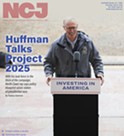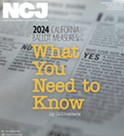[
{
"name": "Top Stories Video Pair",
"insertPoint": "7",
"component": "17087298",
"parentWrapperClass": "fdn-ads-inline-content-block",
"requiredCountToDisplay": "1"
}
]
Gov. Gavin Newsom's message on homelessness in recent weeks has been clear: The state will no longer tolerate encampments, and cities shouldn't either.
Californians who live on the streets, as well as the outreach workers who support them, say they're already feeling the difference. Places where someone used to be able to pitch a tent and sleep in peace have suddenly become inhospitable. Police seem to be clearing camps more often and more aggressively, and are less likely to give advance notice before they come in with bulldozers and trash compactors, according to anecdotal reports in some cities. Even in cities where officials said publicly nothing would change, unhoused people and activists say it's become harder to be homeless.
But the shift, sparked by a U.S. Supreme Court ruling and then further fueled by an executive order, hasn't caused a significant increase in shelter beds or affordable housing.
That's led people on the streets to ask: Where are we supposed to go?
"We gotta be somewhere," said Tré Watson, who lives in a tent in Santa Cruz, and says unhoused people are running out of places to go. "We can't hover. We come here, they run us away. We go to any park and they run us away. We go to the Pogonip (nature preserve), and they bring bulldozers."
Homeless Californians and activists from San Diego to Sacramento told CalMatters that enforcement has become more frequent and more aggressive. Some city leaders have made their intentions to ramp up enforcement explicitly clear. The Fresno City Council recently passed an ordinance, which, if it gets final approval later this month, will make it illegal to camp on public property at all times. San Francisco Mayor London Breed said the city will launch a "very aggressive" crackdown, according to the San Francisco Chronicle. Others have said they won't make changes to their encampment strategies. The Los Angeles County Board of Supervisors last month reaffirmed the county won't use its jails to hold homeless people arrested for camping, the Los Angeles Times reported. Los Angeles Mayor Karen Bass also has been critical of criminalizing public camping.
Newsom Pushes for a Crackdown
Homelessness has been a defining obstacle of Newsom's career ever since he was mayor of San Francisco in the early 2000s. And it's only become more pressing — California's estimated homeless population has swelled to more than 181,000, at the same time Newsom is widely rumored to have presidential ambitions.
Earlier this summer, the conservative majority on the U.S. Supreme Court handed cities a new cudgel to crack down on the encampments that proliferate across California's parks, sidewalks and open spaces. Per the Grants Pass v. Johnson ruling, law enforcement can now cite or arrest people for sleeping on public property — even if there are no shelter beds available to them. That's a major change from prior legal precedent, which said it was unconstitutional to punish someone for sleeping outside if they had nowhere else to go.
A month later, Newsom responded with an executive order directing state agencies to ramp up enforcement against encampments, and encouraging cities to do the same. The order didn't technically require cities to act, but last week, Newsom made it clear there will be consequences for cities that don't.
If he doesn't see results in the next few months, and if he doesn't feel local leaders are acting with a "sense of urgency," he'll start redirecting their funding, Newsom said during a news conference outside a homeless encampment in Los Angeles.
"We're done with the excuses," he said. "And the last big excuse was, 'Well, the courts are saying we can't do anything.' Well, that's no longer the case. So we had a simple executive order: Do your job. There's no more excuses."
The state agencies that will be most immediately affected by Newsom's order — Caltrans, California State Parks and the California Department of Fish and Wildlife — did not answer questions requesting details about how the executive order will change how they clear encampments on their property, nor did they provide data on their prior abatement efforts. State Parks referred questions to the governor's office, which did not respond.
'Where do we go?'
In San Francisco, where Mayor Breed promised an aggressive crackdown following the court ruling, the city removed 82 tents and five other structures from the streets the week of July 29 through Aug. 2. Abatement teams engaged with 326 people during those operations — 38 of whom accepted a shelter bed — and arrested or cited nine people, according to the city.
Other cities are passing or considering new, more punitive rules as a result of Newsom's executive order. In Fresno, the City Council granted preliminary approval last month to an ordinance that would ban camping on public property at all times, the Fresno Bee reported. Fresno County approved a similar measure.
Stockton Mayor Kevin Lincoln said on Twitter the city must "move urgently" to ensure public safety while also supporting those in need. He made plans for a public study session later this month to discuss how the city will enforce anti-camping ordinances going forward.
In Sacramento, the city is distributing fliers to educate its unhoused residents about the changes under the Supreme Court ruling. The light-blue notices, titled "Attention: Unlawful Camping," warn that people can be charged with a misdemeanor for camping on public property.
"They're forcing someone under threat of arrest to pack up and move all their belongings," said Niki Jones, executive director of the Sacramento Regional Coalition to End Homelessness. "And people's bodies literally can't handle the physical stress."
While Newsom has provided an influx of money for shelter beds and other services in recent years — including $1 billion in this year's budget for Homeless Housing, Assistance and Prevention funds that cities and counties can spend as they see fit — his recent executive order comes with no additional funding. Last year, California cities and counties reported having roughly 71,000 shelter beds. They'd need more than twice that to accommodate every homeless Californian.
"Folks are rightly asking, 'Where do we go?'" Jones said.
Even when shelter beds are available, sweeps often fail to fill them. Santa Cruz, for example, estimates between 30 and 40 people were living in a park encampment it swept in April. Just 16 of those people accepted a shelter placement, while no one kicked out of a nearby nature preserve accepted one.
People living on the streets of Santa Cruz say police often tell them to go to a sanctioned encampment on the National Guard Armory property — where residents sleep in tents and get meals and showers. But many people won't even consider it. Several unhoused people CalMatters spoke to said they didn't want to live somewhere with strict rules and a curfew.
Stephanie Ross, who has been living on the streets of Santa Cruz for seven months, recently lost everything in a sweep. All she had left was the outfit she was wearing — a dinosaur-print dress, pants covered in pink flowers and a sweater she found on the ground. On Wednesday, she met up with a local activist to pick up a new tent to replace the one she says was confiscated by police a few days ago.
Ross said she can't concentrate on finding a job or doing anything else, because she's constantly worried about hiding her blankets and other possessions from the police. Even so, she worries she'd chafe under the rules of the Armory tent shelter.
"I need a little bit more freedom than that," she said.
Demarr Clark, 42, said no one offered him a bed when police recently kicked him out of his camp on the sidewalk outside the Santa Cruz shelter. He lost everything he owned, including his tent, he said. Afterward, Clark moved across the street with a new tent gifted to him by a friend.
Clark grew up in Santa Cruz, and the city always seemed like a place where you could find somewhere out of the way to camp, he said. But that's changing, he said. "It just seems like they have no tolerance for it anymore."
This story was initially published by CalMatters, a nonprofit, nonpartisan newsroom dedicated to explaining California policy and politics.
more from the author
Latest in News
Readers also liked…
-
Through Mark Larson's Lens
A local photographer's favorite images of 2022 in Humboldt
- Jan 5, 2023
-
'To Celebrate Our Sovereignty'
Yurok Tribe to host gathering honoring 'ultimate river warrior' on the anniversary of the U.S. Supreme Court ruling that changed everything
- Jun 8, 2023
































